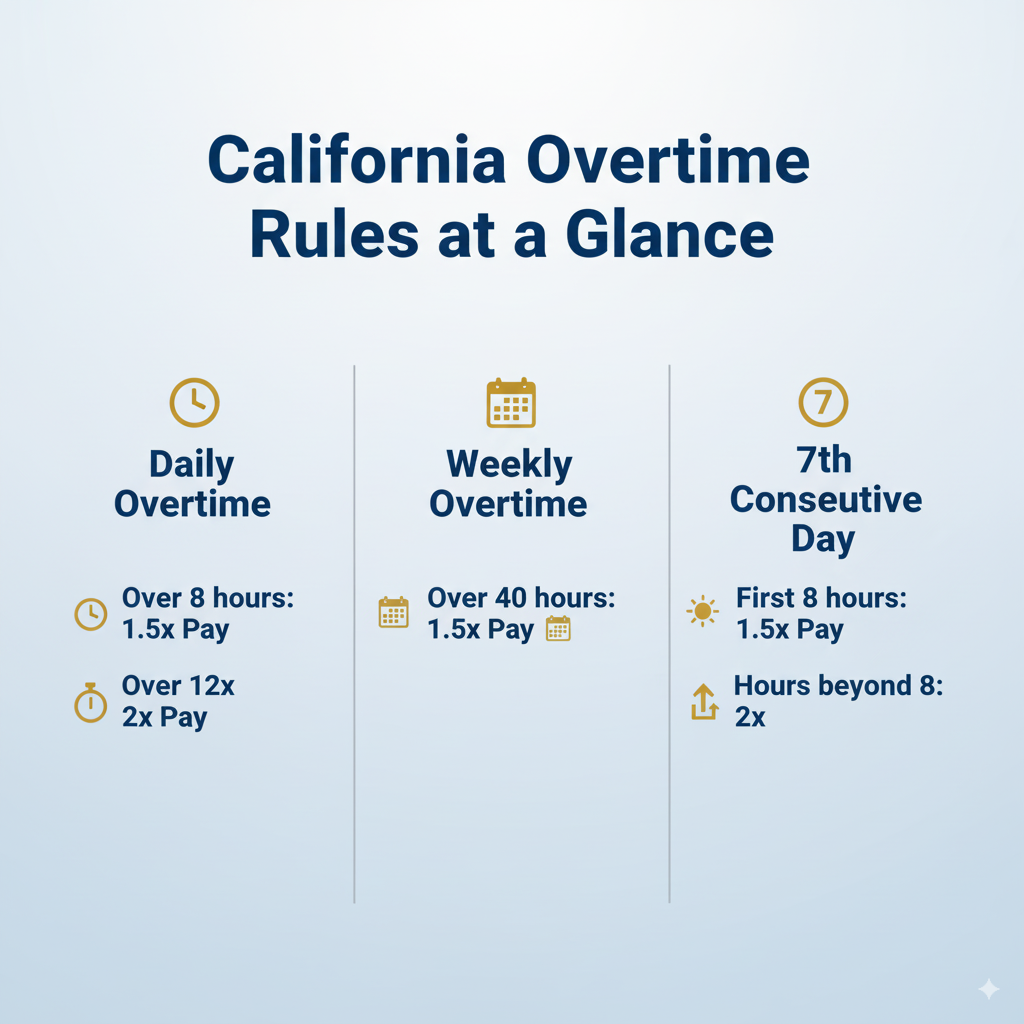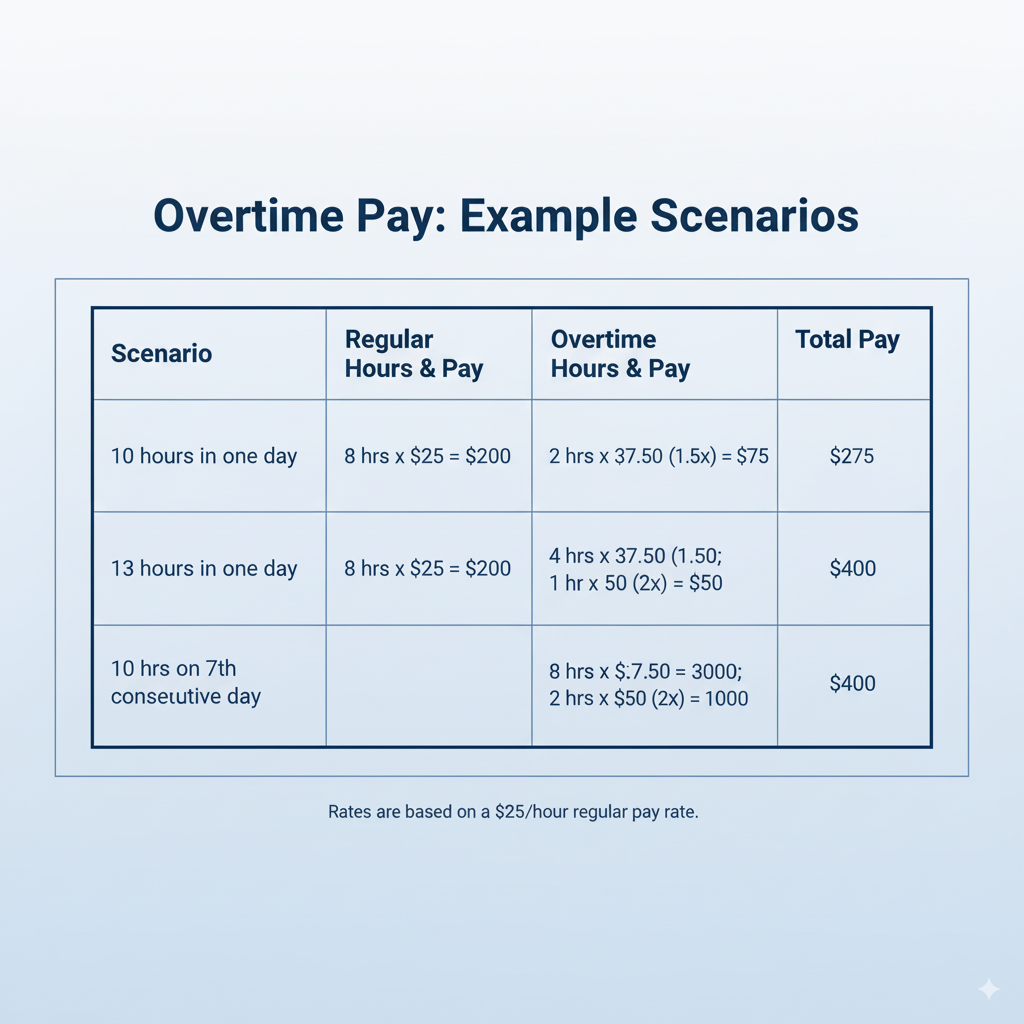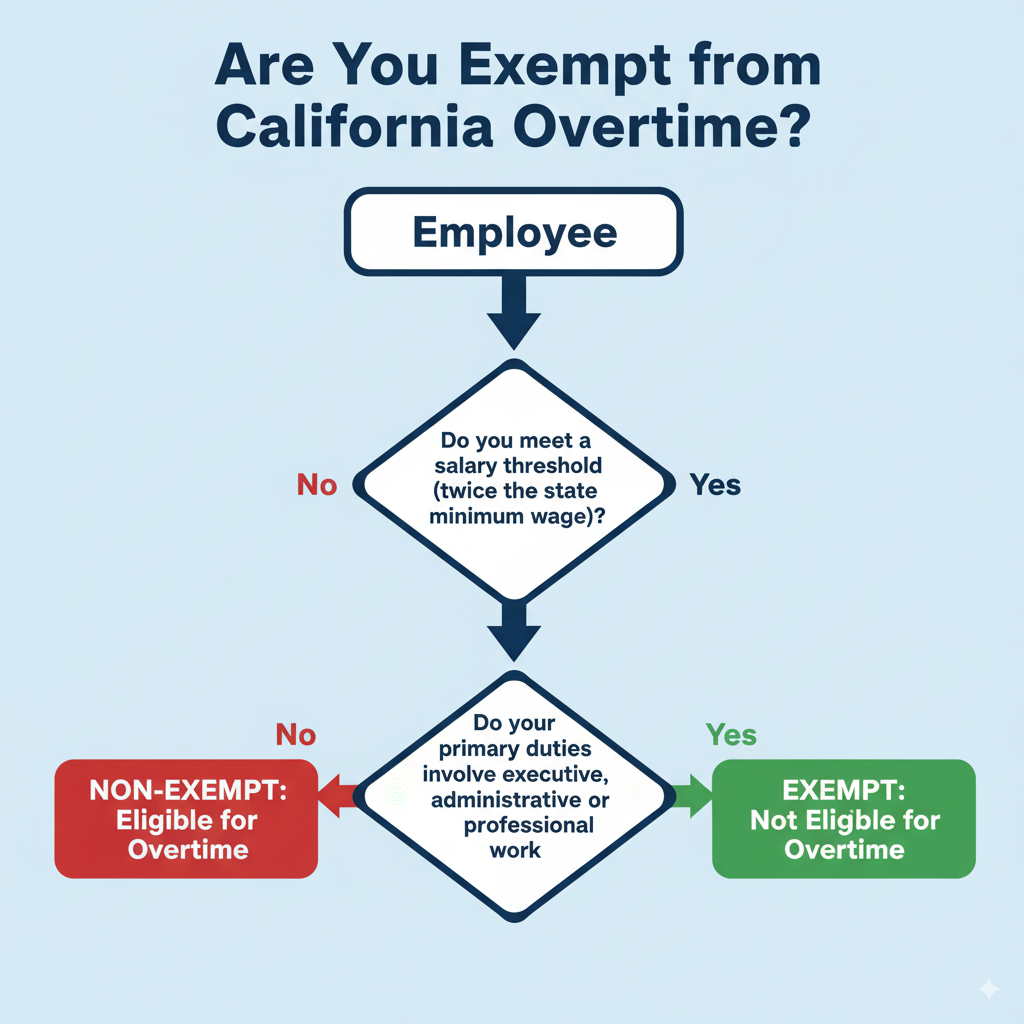California Overtime Calculator
Daily Hours Worked
Pay Calculation Results
Daily Breakdown
`; days.forEach((day, index) => { if (dailyHours[index] > 0) { const dayName = day.charAt(0).toUpperCase() + day.slice(1); const breakdown = dailyBreakdown[index]; resultHTML += `- Regular: ${breakdown.regular.toFixed(2)} hours
${breakdown.overtime > 0 ? `- Daily OT (1.5×): ${breakdown.overtime.toFixed(2)} hours
` : ''} ${breakdown.double > 0 ? `- Double Time (2×): ${breakdown.double.toFixed(2)} hours
` : ''} ${index === seventhDayIndex ? `7th consecutive day premium pay applies
` : ''}
Explore Our Free Tax Calculators and Tools
California Overtime Calculator – How to Calculate Overtime Pay in California
California overtime laws under the California Labor Code impose strict requirements on employers to pay non-exempt workers time-and-a-half after 8 hours in a workday or 40 hours in a workweek, and double time after 12 daily hours or 7 consecutive workdays. Businesses that miscalculate overtime face costly penalties, wage claims, and lawsuits. Our California overtime calculator helps employers verify compliance, accurately estimate labor costs, and avoid violations of state overtime rules.
What is Overtime in California?

California has some of the most employee-friendly overtime laws in the U.S. According to the California Labor Code, Section 510, overtime pay is mandatory in the following situations:
Over 8 hours in a single workday – time and a half
Over 12 hours in a single workday – double time
Over 40 hours in a single workweek – time and a half
7 consecutive days of work – time and a half for the first 8 hours, double time beyond that
These rules apply to non-exempt employees, and employers must comply or face penalties under the California Division of Labor Standards Enforcement (DLSE).
How is Overtime Calculated in California?
Let’s break down the various rules California uses to calculate overtime:
Daily Overtime
1.5x pay after 8 hours worked in a single day
2x pay after 12 hours worked in a single day
Weekly Overtime
1.5x pay for hours worked over 40 in a workweek
7th Consecutive Day Rule
If an employee works 7 days in a row:
1.5x pay for the first 8 hours
2x pay for any hours beyond 8 on that day
Step-by-Step Guide – How to Calculate Overtime Pay in California
Step 1: Determine Regular Rate of Pay
Start with the employee’s hourly wage. If the employee earns bonuses or commissions, those must also be factored in under California Code of Regulations, Title 8, Section 11040.

Example:
If the hourly rate is $20, then:
Time and a half = $20 × 1.5 = $30/hour
Double time = $20 × 2 = $40/hour
Step 2: Identify Overtime Hours
Calculate the total hours worked per day and per week. Apply whichever rule gives the employee more pay, not both.
Step 3: Apply the Correct Overtime Rate
Multiply:
Overtime hours at 1.5x
Additional overtime hours at 2x
Step 4: Calculate Total Overtime Compensation
Add the total regular pay and overtime pay to get the full earnings for the pay period.
California Overtime Calculator Tool
A California Overtime Calculator simplifies the math. You just need to input:
Hourly wage
Total hours worked per day
Number of days worked in the week
The tool will show:
Regular pay
Overtime pay (1.5x)
Double time pay (2x)
Total estimated earnings
Why California Overtime Laws Are Stricter Than Federal Rules
Unlike the Fair Labor Standards Act (FLSA) which only considers weekly overtime, California enforces daily thresholds too. This means you can earn overtime even if you worked less than 40 hours a week—if you crossed the 8-hour daily limit.
Example:
4 days × 10 hours/day = 40 hours/week
You still get 8 hours of overtime pay (2 extra hours each day)
Common Mistakes When Calculating Overtime in California
Assuming overtime is only calculated weekly
Ignoring 7th consecutive day rule
Not counting bonuses in regular rate
Misclassifying exempt vs. non-exempt employees
To avoid fines and payroll issues, always follow the California Division of Labor Standards Enforcement (DLSE) rules. For compliance, see DLSE Enforcement Policies and Interpretations Manual
Who Is Exempt From California Overtime Rules?
v
Some employees are exempt from overtime, including:
Executives and managers
Licensed professionals (e.g., lawyers, doctors)
Independent contractors
Salaried employees earning at least twice the state minimum wage and meeting other criteria
Always verify exemptions through California Wage Orders.
FAQ: California Overtime Pay
How do you calculate overtime in California manually?
Use the daily and weekly rules. Count hours worked above 8/day or 40/week, apply 1.5x or 2x pay rates.
What is double time pay in California?
Double time is paid at 2x your regular rate for:
Hours beyond 12 in a day
Hours beyond 8 on the 7th consecutive workday
Does California have an overtime calculator?
Yes! Many online tools help you estimate your California overtime pay. You can use ours here.
Is overtime after 8 hours or 40 hours in California?
Both. California requires overtime after 8 hours per day or 40 hours per week, whichever benefits the employee more.
How is overtime taxed in California?
Overtime is taxed like regular income. Use a California paycheck tax calculator to estimate take-home pay.
Bottom Line
California’s overtime laws are among the most comprehensive in the country. Whether you’re a worker ensuring fair compensation or an employer managing compliance, it’s essential to understand how to calculate overtime pay in California.
Use our California Overtime Calculator to simplify the process, stay compliant, and ensure you’re being paid or paying correctly.
Disclaimer: The tools and content on USATaxCalculator.com are for informational purposes only and do not constitute tax or financial advice. Our calculators provide basic estimates and may not reflect the exact tax results.
We recommend consulting a certified tax professional or the Internal Revenue Service (IRS) for accurate guidance. USATaxCalculator.com is not responsible for any decisions made based on the information provided.